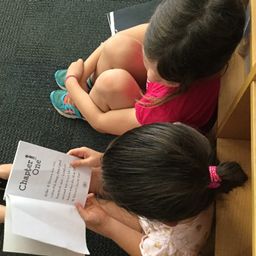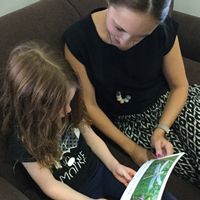Today’s blog is about parent engagement. This is not because I was a perfect parent and I can now tell you exactly what you need to do! It is because the research on this topic is very clear and tells us that you, the parents/carers, are the most important factor in your child’s educational outcomes. Teachers are important but you are the most important factor and the way we can all work together will give your child the best educational advantages possible.
So in this blog I will share some of the research with you and hope that we can make a genuine partnership between students, families and BEPS that really positively to impact on the student learning outcomes.
Positive parent engagement helps to:
- develop a greater sense of personal competence and a stronger belief in the role and importance of education

- instil a love of learning and reading instead of a message of fear and failure. We want parents and children to work together in a context of joy and happiness around reading because that’s what’s going to transfer into the classroom; and it’s really going to make a difference to how your child feels about themselves as a reader.
Whether the parent engagement is construed as home‐based behaviors, school‐based activities, or parent‐teacher communication, parental engagement has been positively linked to indicators of improved student outcomes and psychological outlook and attributes that support student achievement.
So what can parents do?
- Have high expectations for your children and confidence in your child’s ability to improve. Research has shown that parental expectations are one of the strongest predictors of student achievement. So, let your children know that you think it is important that they do their best. This includes academically and socially. Expect that your children are respectful of themselves and others, respectful of the teachers and the wider community and respectful of our environment at BEPS and beyond.
- Talk with your children about what’s happening at school – what activities they really like and what they are learning. Surprisingly, this has a greater impact on academic achievement than monitoring homework, being at home after school for your kids, or limiting the screen time they are allowed to have each week. This doesn’t mean grill them about what happened at school today but at least show a genuine interest.
- Help your child develop a positive attitude toward learning and good work habits. The research shows that the greatest influence you can have on your child’s chances for success in school lie in how you influence their attitudes, their sense of personal competence, and their work habits, including persistence, seeking help, and planning.
So rather than trying to directly “teach” your children, focus on helping them handle distractions and crises of confidence, praise them for effort and persistence and demonstrate a positive attitude about school as a whole. Bit by bit, these are the attributes that will build solid foundations for ongoing success. Hence, recognise what your child has done. This might mean that you recognise the effort they put in, the fact that they have completed learning tasks, that they tried a number of times, or different ways, to achieve their goal and didn’t just give up, and that they asked for help when needed. - Be a role model – read the newspaper or a book, have a go at a crossword or a sudoku and see if you can improve. Make a goal for yourself and plan the steps to get there. Let you children see you do this.
- When your child does ‘well’ ask them what they did that helped them get through. Please don’t just praise them for good work. Ask what can they improve for next time? How can they use this behaviour or thinking to help them when learning is difficult?
- Help them to recognise that they have control over how much effort they put in and the strategies they use. These do make a difference to their learning and social outcomes.
- Encourage your child to see success in boarder terms. For example; understand something new; being interested in what I am learning; learning new things or developing new skills; improving on my last performance.
Read together
Reading is one of the foundations of all education, and you can make a big difference by reading and talking about books and stories with your children. Reading with children is the best way to turn them on to reading. But this doesn’t mean that you should be forcing them to sound out words. Instead of focussing on teaching your children the mechanics of reading, teach them to love reading. Make reading fun and enjoyable! Sharing stories, talking and singing every day helps your child’s development. You’re helping your child become familiar with sounds, words, language and the value of books. This all builds your child’s literacy skills, helping them go on to read successfully later in life.
Reading stories also sparks your child’s imagination, stimulates curiosity and helps with brain development. Interesting illustrations and word patterns – such as rhymes – can get your child talking about what they are seeing and thinking, and help them understand the patterns of language.

Hence, I ask that you don’t take home harder and harder books but take home books that your child enjoys and can read with minimal assistance. If they want one that is too hard for them to read – could you read it to them? I know that many of you are extremely time poor but if at all possible please listen to your child read every day or you read to them. Make it fun – try out all those wonderful creative talents that you have and read the story with animation, funny voices, and theatrical antics, and just enjoy those few minutes that you have each day together. I promise you that they grow up very quickly and after about year 9 they might not want you to read to them anymore. Although at that age my daughter and I read the occasional book backwards – so that we could make them sound like Shakespeare. We had no idea what the book was about but we had a great time together.
Parent involvement in school activities
Whether it is attending a school concert, cheering on a school team, or participating in community events or being on school council, parent involvement in school activities can foster a sense of community within the school. It can build stronger relationships between teachers and parents, and provide an opportunity for parents to connect with and support each other.
School-based activities may not have a direct impact on student achievement, but they can be a fun and engaging way to build a stronger school community. When you can, take advantage of the opportunity to participate in school events to show your support for your children’s school.
The evidence is clear.
Parents make a difference. And the way they contribute most to their children’s education is through what they do at home. Being a parent can be challenging, but the good news is that you don’t have to be ‘volunteer of the year’ or an expert on the war of 1812 to help your child succeed at school.
You need to be positive about their learning and help them to find enjoyment and wonder in what they learn and help them to build positive attitudes.




February 24, 2017 at 7:49 pm
A great blog today Janet with some really practical tools to use. As a parent I definitely feel like a student too!
LikeLike
February 24, 2017 at 11:37 pm
Thanks Colleen. One of the absolutely great things about kids is that they encourage, possibly require, us to learn every day. It’s really exciting to learn and enjoy learning along side them.
LikeLike
February 25, 2017 at 4:02 pm
Thanks for this article Janet, it is empowering to know that by simply taking an interest we can have a positive influence on our children’s academic outcome.
LikeLike
February 25, 2017 at 9:57 pm
Thank you for a very good information Janet. I believe being a parent is never ending learning process. 😉
LikeLike
February 27, 2017 at 2:22 pm
Thanks Janet, good information about being fun when reading and not pushing too hard. I’ll take things from the article and put them in practice.
LikeLike
February 27, 2017 at 8:37 pm
Thanks Janet, another informative article. Although I must say after having read out loud the whole Harry Potter series, first to my big boys as it was initially published, and now to Alex, I’m feeling very inclined to some ‘quiet reading’ on my own !
On another note, and as a new family at BEPS, I’d appreciate some more information on how the Curiosita component of the timetable works.
LikeLike
February 28, 2017 at 1:24 pm
HI Kaye,
Reading ALL of the Harry Potter books sounds like heaven to me. I hope you did all the character voices??
Thank you for contributing to “The BEPS Conversation” and for being the first to provide me with a topic to write on. I will not be able to cover Curiosita this week but I ask that you keep an eye out for my response in the weeks to come.
Nice ‘talking’ to you.
Janet
LikeLike
April 30, 2017 at 2:00 pm
This blog is wonderful and very encouraging. Thank you!
LikeLike
April 30, 2017 at 7:32 pm
Thank you Mel.
Janet
LikeLike